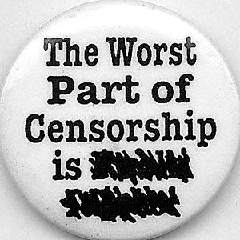Internet censorship is a subject that really interested me, specially in Cuba . We have talked about it many times in class, so, for my last post, I have decided to investigate further.
It is an indisputable fact that censorship exists, but I found an article in a newspaper whose headline was : "Cuba will eliminate Internet censorship. " Who will believe such thing?

After Egypt suffered a total cut of the Internet and cell phones signal of the, the experts again set eyes on Cuba, which is one of the countries, with Egypt, China, Arabia, North Korea, Iran and six other Moreover, with most censored websites and use of personal technologies (cell phones, mainly). What’s more, Cuba and North Korea are considered as countries where the censorship goes futher , according to a study by Harvard, Oxford, Cambridge and Toronto, which concluded that government control of the network is increasing.
Nowadays, just the 1.6% of the population has Internet access, which is 14 in every 100 citizens. Most of those who have that access are academics, government officials and foreign businessmen, so it appears to be one of the countries with the lowest rate of connectivity, which is very limited.
It is a shame to hear what the vice-minister of communications has recently said : "Restricting access to Internet in Cuba has no political background, but technical. The Castro government's desire is to open access to the general public”. Now it seems to be that the real culprit is the U.S. and its trade embargo, which forced him to use a satellite link, slow and expensive.
It is a shame to hear what the vice-minister of communications has recently said : "Restricting access to Internet in Cuba has no political background, but technical. The Castro government's desire is to open access to the general public”. Now it seems to be that the real culprit is the U.S. and its trade embargo, which forced him to use a satellite link, slow and expensive.
However, experts from associations such as Reporters Without Borders say that Internet censorship is it's mostly caused by technical barriers, cuts and constant failures, a very limited access, and of course, unaffordable prices, as happens in Cuba and in almost all those countries including Egypt.
The thing that worry the most is the fact that most of the Cubans do not have full access to the Internet, they can only enter the site to check e-mail (which can be filtered by the government whenever they want) and intranet pages selected by the government .
Of course, the use of social networks like Facebook and Twitter in Cuba is totally zero. Even the few bloggers and journalists have relied on others to upload their material to the Internet. "We never see what we publish on the Internet. We have dictate to some foreign friends through cell phone text messages or in a paper, " once said Yoani Sanchez, a Cuban blogger of 33 years who has become famous for his reports broadcast on the web and that has never seen published, it says it has no access to the Internet for free.
Since 1996 web connection allows only 393 megabytes per second downstream and 209 upstream (a traditional connection is 50 gigabytes).But this could change when a fiber optic cable connecting to 1.600 kilometers Cuba to Venezuela, 3.000 multiplied by the speed of data transmission on the island.
Thus, Cuba could enjoy a bandwidth of 640 gigabytes and give a capacity of 10 million simultaneous phone transmissions, which in turn will lower costs
This system could be operational in July. That's when the Cuban government will ensure that investment in network infrastructure to bring Internet to Cuban homes.
Do you trust?

Well, I love your blog, so many colors are quite shocking, and I quite like your topic, it seems that the repression made in some countries on the Internet are taking strength from the students of our college (I included myself within that group, that's why in my last post also I talked about Cuba and its blockade on the internet xD).
ResponderEliminar